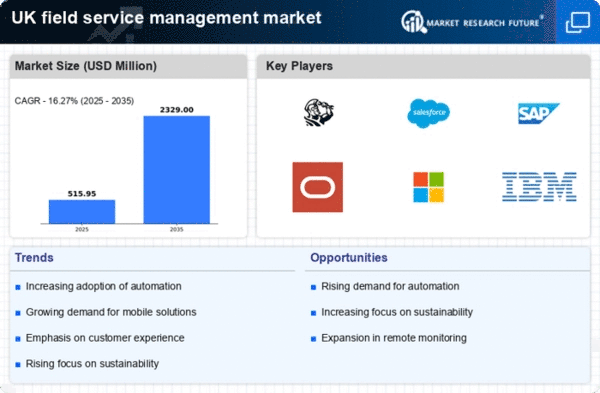Shift Towards Sustainable Practices
Sustainability is emerging as a pivotal driver in the field service-management market. With increasing awareness of environmental issues, companies are under pressure to adopt sustainable practices in their operations. This shift is prompting organisations to invest in eco-friendly technologies and processes, such as electric vehicles for service fleets and energy-efficient equipment. According to recent estimates, businesses that implement sustainable practices can reduce operational costs by up to 30%. As sustainability becomes a core value for consumers, companies that prioritise eco-friendly solutions are likely to enhance their brand reputation and customer loyalty. Consequently, the field service-management market is expected to expand as organisations align their strategies with sustainability goals.
Growth of Remote Monitoring Solutions
The field service-management market is witnessing a surge in the adoption of remote monitoring solutions. These technologies enable companies to track equipment performance and diagnose issues without the need for on-site visits. This capability not only reduces operational costs but also enhances service efficiency. Recent data indicates that organisations utilising remote monitoring can decrease service response times by up to 40%. As businesses increasingly recognise the benefits of remote monitoring, the demand for such solutions is likely to grow. This trend is indicative of a broader shift towards digital transformation within the field service-management market, as companies seek to leverage technology to optimise their service delivery and improve customer satisfaction.
Technological Advancements in Service Tools
The field service-management market is experiencing a notable transformation due to rapid technological advancements. Innovations such as artificial intelligence (AI) and machine learning are enhancing operational efficiency and customer satisfaction. For instance, AI-driven analytics can predict equipment failures, allowing for proactive maintenance. This shift is reflected in the market, which is projected to grow at a CAGR of 12.5% from 2025 to 2030. Furthermore, the integration of augmented reality (AR) in training and support processes is becoming increasingly prevalent, enabling technicians to resolve issues more effectively. As these technologies continue to evolve, they are likely to reshape the landscape of the field service-management market, driving companies to adopt more sophisticated tools to remain competitive.
Increased Regulatory Compliance Requirements
The field service-management market is significantly influenced by the growing landscape of regulatory compliance. In the UK, industries such as utilities and healthcare are subject to stringent regulations that mandate adherence to safety and quality standards. This regulatory environment compels organisations to adopt robust field service solutions that ensure compliance and mitigate risks. As a result, the market is witnessing a surge in demand for software that can streamline compliance processes and provide real-time reporting capabilities. Companies that fail to comply may face substantial penalties, which further incentivises investment in effective field service-management solutions. This trend is expected to drive growth in the market as businesses seek to navigate the complexities of regulatory requirements.
Rising Demand for Enhanced Customer Experience
In the field service-management market, the demand for improved customer experience is becoming a critical driver. Companies are increasingly recognising that exceptional service can differentiate them in a competitive landscape. This focus on customer satisfaction is leading to the implementation of more responsive service models, including real-time updates and personalised communication. According to recent studies, businesses that prioritise customer experience can achieve up to 20% higher revenue growth. As customer expectations continue to rise, organisations are compelled to invest in technologies that facilitate seamless interactions and timely service delivery. This trend is likely to propel the field service-management market forward, as companies strive to meet and exceed customer expectations.
















